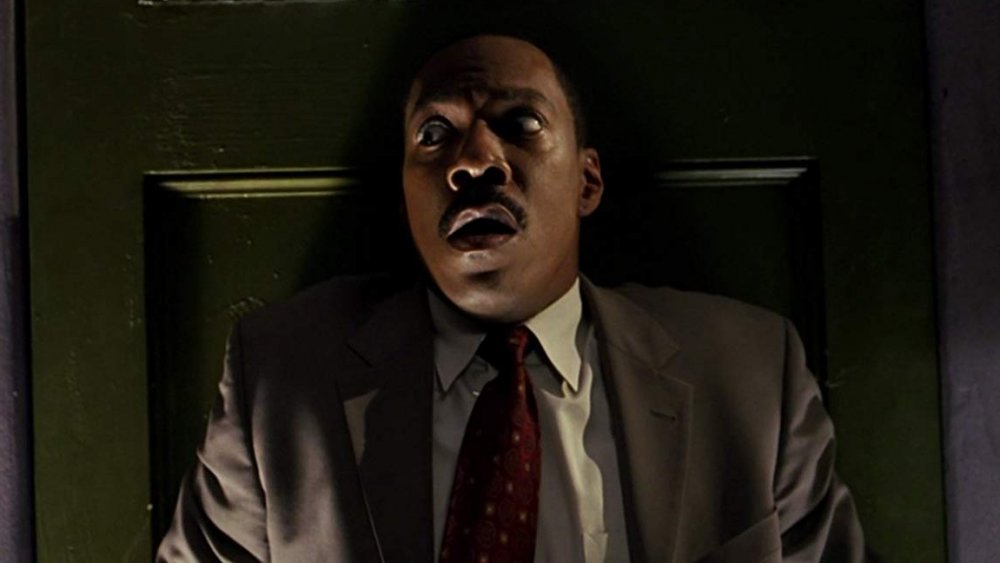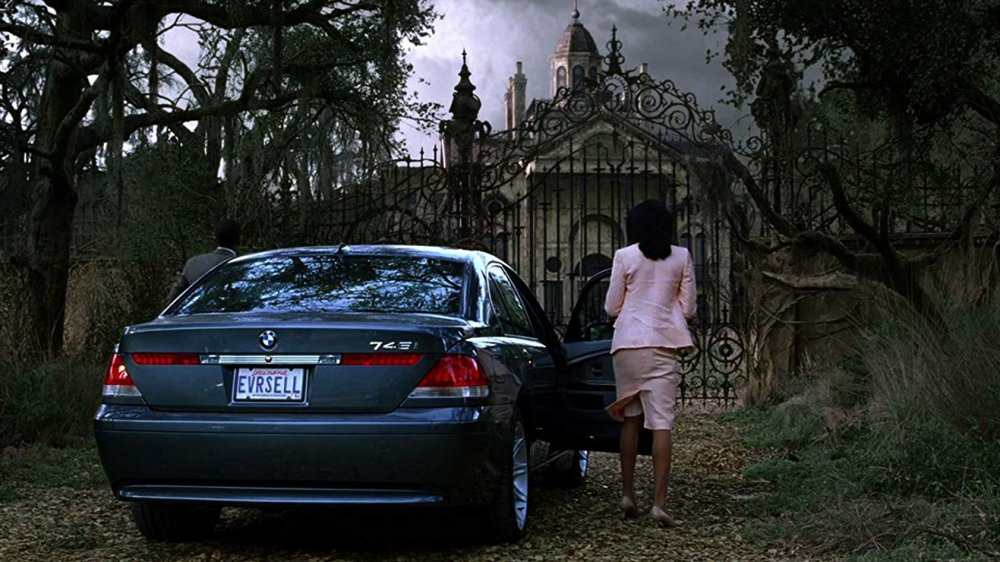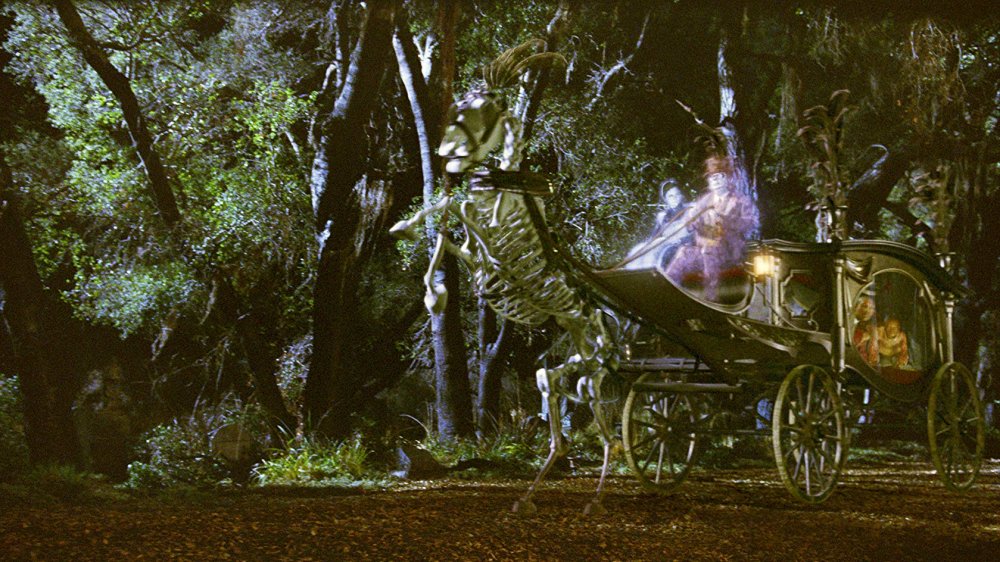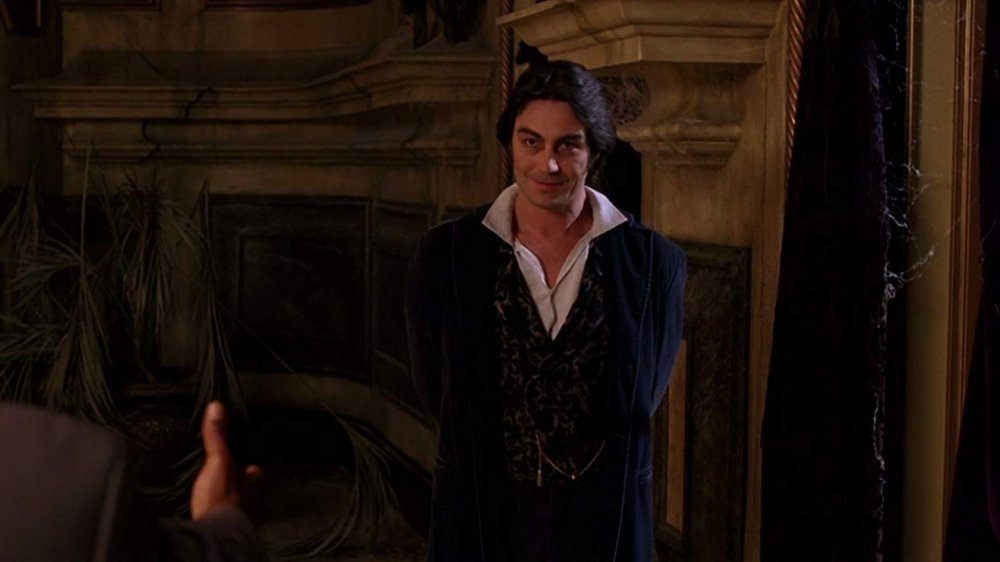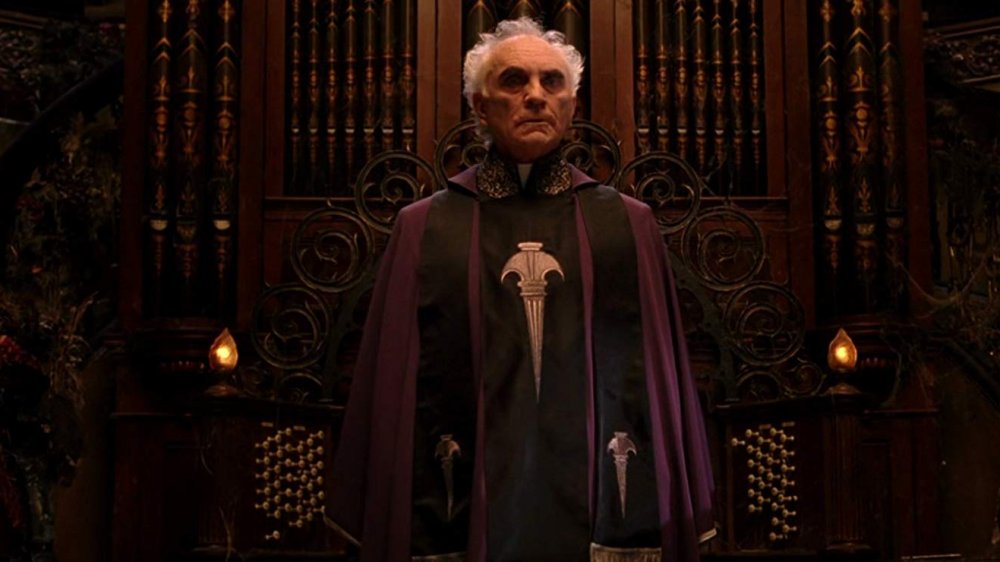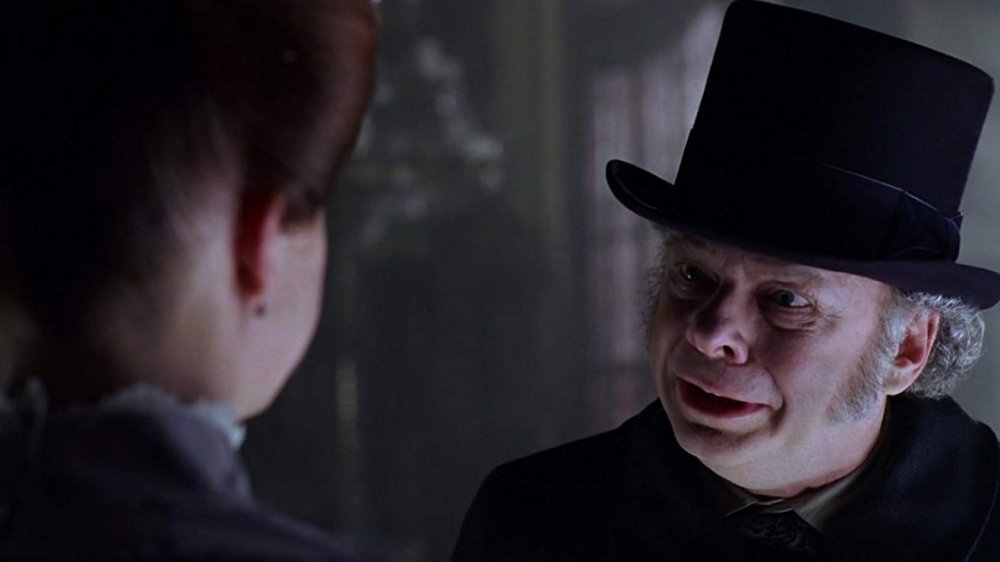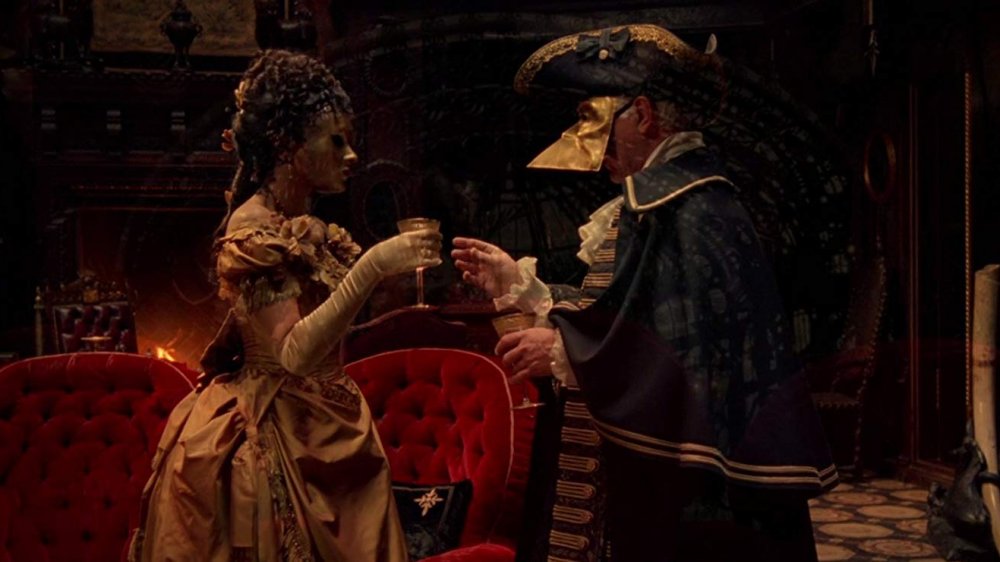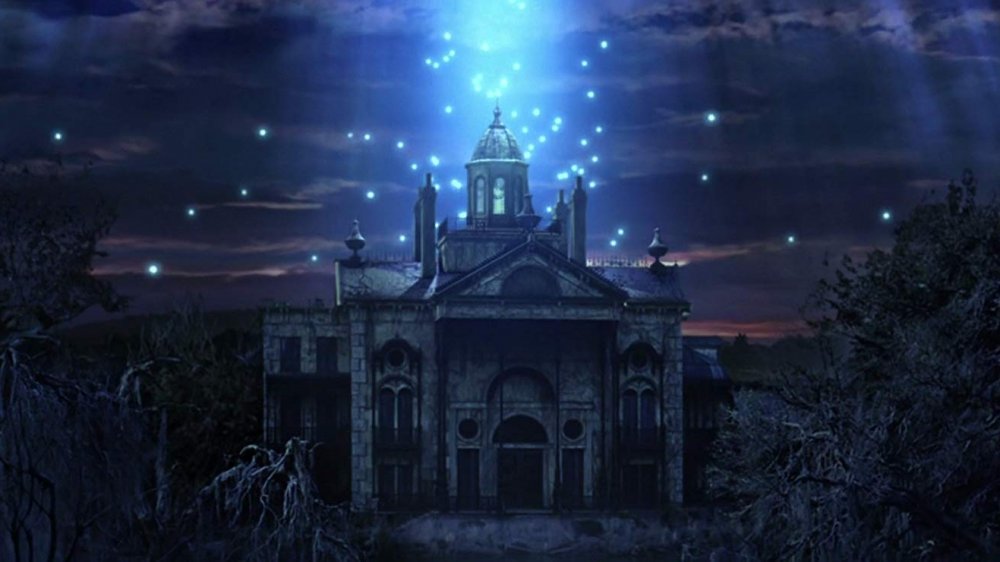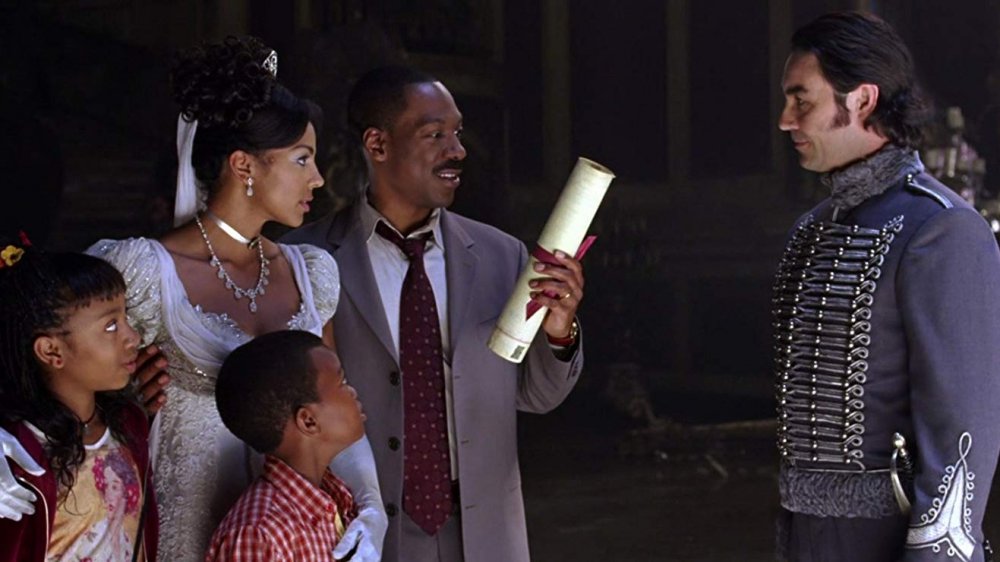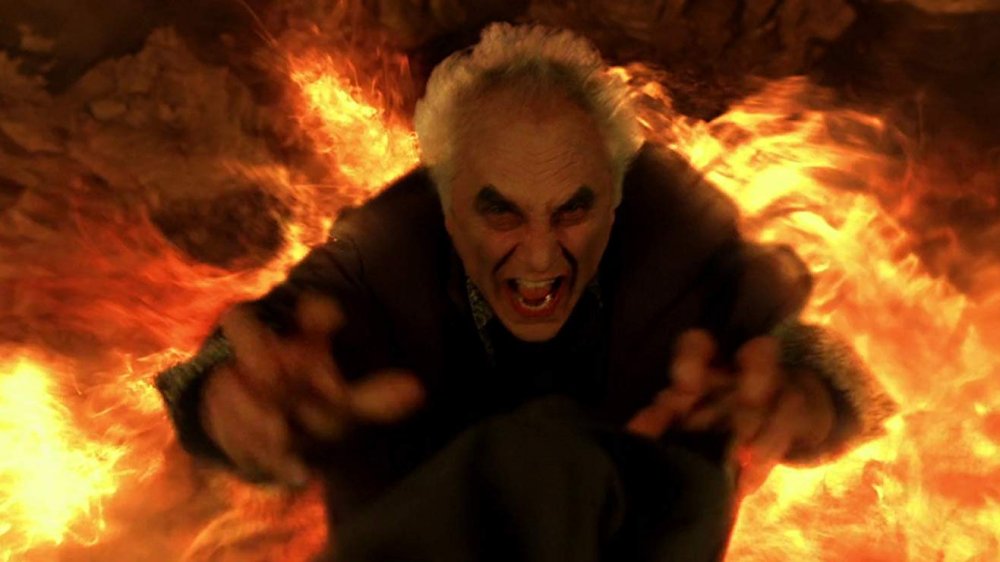Things Only Adults Notice In The Haunted Mansion
In 2003, Eddie Murphy continued his run as a family friendly comedy star with The Haunted Mansion, a film based on the Disney theme park attraction of the same name. The film features plenty of nods and winks in the direction of the mansions at both Disneyland and Disney World while also telling an original story of a house in Louisiana were a curse has left the inhabitants trapped in their ghostly forms. It's up to a husband and wife realtor team and their two kids to try and break the spell.
The Haunted Mansion earned a reasonably solid box office take upon its release, even though it was critically panned and only really shows up in conversations now when it gets replayed on cable for the Halloween season. Look beyond the lukewarm response to the film, though, and you'll see a family comedy that's begging to be picked apart, with an elaborate mythology full of strange implications that child viewers just gloss over while the adults in the room can't stop thinking about them. So, if you're revisiting The Haunted Mansion, here are a few things that only adults notice to keep in mind.
A massive mansion no one knows about
The setup for The Haunted Mansion requires the human characters to get to the titular house as quickly as possible, and the way the Evers family ends up at Gracey Manor is, as a result, quite simple. Jim and Sara Evers are realtors, one of their flyers ends up at the manor, and the ghostly owner has his butler call them to arrange a meeting with Sara, who he believes is the reincarnation of his lost love. When the Evers family arrives at the house, spurred by Jim's workaholic tendencies, they find the place looking like no one's visited in some time.
Over the course of the movie, it's revealed that the grounds of Gracey Manor feature an elaborate necropolis, and the mansion itself is a massive monument on the landscape, so how has it and its many, many ghostly residents gone unnoticed for so long? Jim Evers makes his family go to the mansion after Sara tells him the address, and he immediately knows it's an affluent area; so if he knows that, why don't other people? Perhaps it's part of the curse surrounding the manor, but it's hard to imagine that urban explorers or paranormal snoopers hadn't scoped the place out already.
The many forms of ghosts
As the Evers family explores the titular haunted mansion, the come across a variety of ghosts. It all begins with the butler, Ramsley, and then Edward Gracey, the ghostly owner of the manor. But then things get more complicated. The film establishes that the further away ghosts get from the main house, the more "dead" they are. That means the ghosts that live in the cemetery have blue, ethereal forms, and when the ghosts in the house leave it, they take on the same ethereal form.
That's a simple enough mechanic to understand ... except that there's also a ghostly horse that's just a skeleton running around no matter where it seems to be, and a group of barbershop quartet ghosts that haunt statues, and a Romani fortune teller ghost in a crystal ball, and just flat-out zombies in the tombs beneath the property, rotting flesh and all.
So, what's with all the different ghost forms? The obvious real-life answer is to make the movie look cooler, but why do the above-ground ghosts get to have cool blue wispy forms while the below-ground ones are just walking rotters who want to kill anything that moves? Is that some kind of upstairs/downstairs political thing the movie doesn't want to tell us about?
A curse on everyone, no matter what they did
Gracey Manor is haunted because of a curse visited on it years earlier. In the same way that the characters in Beauty and the Beast are cursed to live as animated objects, the characters of The Haunted Mansion are unable to cross over into the afterlife. Over the course of the film, we learn that this curse happened because Ramsley sabotaged his master Edward's marriage proposal to his servant, Elizabeth. Convinced that their union couldn't happen, Ramsley murdered Elizabeth and made it look like a suicide, causing Edward to take his own life.
And as a result ... everyone on the grounds of the mansion is cursed, including the victims of Ramsley's crime. Why do Edward and Elizabeth have to suffer because of what Ramsley did? They didn't do anything wrong. Perhaps Edward's own deliberate suicide is what cursed the place, but if that's the case, then why does everyone else have to stick around? There are good guys and bad guys in The Haunted Mansion, but the curse is a raw deal for everyone.
A Haunted Mansion founded on racism
The Haunted Mansion is a family horror-comedy with almost no outright horror elements. It's based, as the title suggests, on a popular theme park attraction that exists at both Disneyland and Walt Disney World. It's a film based on the intellectual property of the world's largest family entertainment conglomerate, whose mascot is a talking mouse.
And it's all founded on what's basically a hate crime.
Yes, the whole reason this mansion is haunted, in the continuity of the film, is because a butler got angry that his white master was about to marry a mixed race servant, and decided to poison her to prevent the marriage from happening. He's a racist who didn't think their marriage would look right, and he just straight up murdered a woman because of it. In a movie based on that ride at Disneyland where "Grim Grinnin' Ghosts" plays. You can go to The Haunted Mansion at one of Disney's parks and ignore this fact, but once you've seen The Haunted Mansion, it's hard not to think about it at least a little bit.
Cooking ghosts
One of the key comedic hooks of The Haunted Mansion as a movie rests on the premise that the Evers family does not know they're heading to a house full of ghosts. When they meet the major players in Gracey Manor, they at first appear as normal (if a little strange) human beings. One of the first things Ramsley the butler does when they arrive is serve them an elaborate dinner. Later, when we meet Rita the maid, she serves the Evers children a plate of fresh cookies.
It's well established throughout the film that these ghosts are able to handle physical objects, so it's not surprising that they were able to do things like serve soup and bake cookies, but ... who went to the grocery store for them? Did they have that stuff delivered and just pay for it with old money lying around the mansion? Did they only make the food from the stuff they grew out on the grounds? If they did, we didn't see it. Whatever the case, those are some very resourceful ghosts.
Punished for no reason
The Haunted Mansion is a film in which a house full of people is cursed to an eternal ghostly existence because the butler sabotaged the owner's marriage to his lover, but we don't learn this right away. The film takes its time unfolding the mystery of exactly why the place is cursed, and one particular mystery isn't solved until the very end.
Edward Gracey killed himself when he found out his lover was dead, but we see him almost immediately when the Evers family arrives at the mansion. He's cursed to be a ghost, but he can move around and look normal. His lover, Elizabeth, is also hanging around the house, but she exists as what the Evers kids call a "ghost ball," a wordless orb floating around until she finally possesses the body of Sara Evers at the end of the film to tell her side of the story. Elizabeth then explains that she couldn't be freed until the truth of what happened to her was told, but what she doesn't explain is why. Elizabeth did nothing wrong. She fell in love with a rich man and then that man's butler murdered her, and as a result she's punished for ... unwittingly drinking poison? Her glowing prison only seems to exist to serve as a clever last-minute reveal.
All ghosts go to heaven? Not quite
We can pick apart the particulars of the curse at the heart of The Haunted Mansion all we want, because in terms of who it affects, how it affects them, and why, it's a rather flimsy concept. Despite that, though, one key role seems to apply across the board for most of the movie: The ghosts are at the mansion because the curse is keeping them from moving on into the afterlife. That's explained pretty early on, and when the film reaches its climax, it seems to pay off. The curse is lifted when the spirits of Elizabeth and Edward are reunited, and the ghosts all float up into heaven as bright orbs of light, signifying their final passage from this world.
Except ... the ghosts don't all do that. The final scene of the film reveals that the Evers family is still dealing with Leota, the fortune teller ghost, as well as the barbershop quartet who exist as singing statues in the graveyard. What the film doesn't explain is why these ghosts stuck around. Did they choose to because being spooky is fun? Did they get stuck in the objects they possess? We don't know, but if they're stuck and need to be let out, that's very unfair.
The tax burden of a haunted mansion
The human journey of The Haunted Mansion is that of the Evers family as they try to navigate their personal issues — namely Jim's workaholic tendencies and his son Michael's paralyzing fear of spiders — while also trying to help a cursed group of people find their way to the light. In the end, after plenty of shenanigans, they succeed, breaking the curse of Gracey Manor by revealing the truth about what happened to Elizabeth and allowing her to be with Edward again, while also defeating the evil Ramsley. For their trouble, they are awarded the deed to Gracey Manor in the form of a big, ribbon-tied scroll handed to them by Edward before he departs for the afterlife.
It's a nice little moment in some ways. After all, it's the ultimate victory for a pair of realtors to nab a mansion that they can do whatever they want with, but there's a reason a lot of haunted house movies don't touch on this issue: it forces us to ask who has owned the mansion since Edward died? Has the local government simply forgotten about it, or has Edward forged paperwork to make himself look like his own great-grandson so he can keep the property taxes current? And for that matter, who installed things like the phone line? It all unravels if you think about it from a homeowner's perspective.
Ghosts and magic
Most of the fantasy stuff in The Haunted Mansion is, as the title suggests, revolving around ghosts. A decades-old curse fell on the house after a tragedy; the ghosts can't leave while the curse is in place. Hauntings are not the only supernatural happenings at Gracey Manor, though. There's also a very prominent element of magic in certain plot points. Madame Leota, the fortune teller trapped in a crystal ball, is apparently still very good at prophecy, and Ramsley the evil butler reveals that he has certain magical tricks up his sleeves, including an ability to magically lock Jim out of the house. Then, at the end, Ramsley tries to summon some evil ghosts to fight Edward, only to be defeated when a full-blown dragon made of fire jumps out of the fireplace and drags him down to Hell.
Even setting aside the idea that the film seems to be explicitly evoking hell as a place of fire and punishment, where did the dragon come from? Was he hanging out the whole time? Who summoned him? Were forces in another realm just watching all of this drama unfold, waiting for their moment? Clearly there are bigger things happening than what we're seeing onscreen.
